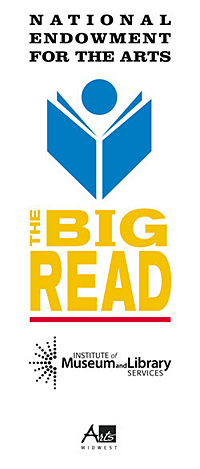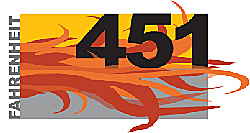Ray Bradbury’s vision of the future was a scary one indeed.
Of course, that’s the point of being a science-fiction writer, but in his classic Fahrenheit 451, Bradbury wrote about firemen who didn’t necessarily put out fires. Rather, they started them in order to burn books and suppress learning and knowledge.

The book is the centerpiece of a National Endowment for the Arts-supported program in February.
“The Big Read,” hosted by the University in partnership with several local organizations, will feature lectures, readings, art exhibits, theater productions, book discussion groups and film festivals featuring the themes of Bradbury’s novel.
Modeled on successful “city read” programs, The Big Read is a national program designed to encourage literary reading by helping communities come together to read and discuss a single book.
Area sponsors include the Department of English in Arts & Sciences, local governments, library districts, school districts, museums, arts and literacy organizations, the Regional Arts Commission, KTVI Fox 2 and HEC-TV.
The Big Read is an initiative of the NEA in partnership with the Institute of Museum and Library Services and Arts Midwest. The 2004 NEA report, “Reading at Risk: A Survey of Literary Reading in America,” identified a critical decline in reading for pleasure among American adults. The Big Read aims to address this issue directly by providing citizens with the opportunity to read and discuss a single book within their communities.
“With The Big Read, we want to get everyone in a community — from high school kids and office workers to public officials and senior citizens — reading a great book together,” said NEA Chair Dana Gioia. “Our goal is to get people talking about Fahrenheit 451 … with the same conviction that they debate the World Series. We want people to feel worse about not reading the book than they do about missing an episode of Lost or CSI.”
David A. Lawton, Ph.D., professor and chair of the Department of English, says, “Of the books on the NEA’s recommended list, Fahrenheit 451 is the one that most profoundly raises the all-important question of the utility of books. Now that the Internet presents a more fundamental challenge even than Bradbury’s fire to the continued viability of books, we will have an opportunity to explore the viability of books as well as other printed and electronic mediums and their roles in developing an informed and inquiring citizenry.”
Lawton, who is spearheading The Big Read at WUSTL, continued, “The University and its partners are excited to facilitate public discourse on the themes of Fahrenheit 451 — censorship and the repression of knowledge. The ability to address these issues thoughtfully in public conversation is essential to the development of citizens who are engaged in their communities and in the pursuit of learning.”
Lawton will launch one of the first events in conjunction with the program when he speaks for the university’s Assembly Series at 11 a.m. Jan. 24, in Graham Chapel. His talk, titled “Burning to Read,” will address the fundamental importance of reading, having choices and of having books both in printed and digital form. Lawton also will explore the history of reading – which is less than four milennia old —and the long historical battle to have free access to books. In addition, the event will include several staged readings from Fahrenheit 451 performed by English Department professor Dan Shea and Washington University students.

In February, The Mildred Lane Kemper Art Museum will debut the exhibition Reality Bites: Making Avant-Garde Art in Post-Wall Germany, which explores the specific nature of art made in Germany since the fall of the Berlin Wall in 1989. It focuses on a new generation of international artists working in Germany and addresses their varied attempts to challenge the relation between art and the everyday in a transformed society. Education guides will relate specific works to themes addressed by Fahrenheit 451.
On Feb. 13 and 14 Somali author Nurrudin Farah, who has been called the greatest living African novelist, will host a pair of events. Though his works were banned in Somalia for many years, Farah is now one of the negotiators attempting to quell the current struggle in his war-torn country, and so understands both the remarkable power of words and the importance of protecting that power. At 8 p.m. Feb. 13 Farah will read from and discuss his work as a Hurst Visiting Professor for the Department of English. At 11 a.m. Feb. 14 Farah will focus on “Political Islam and Clan in Present-day Somalia” for the Assembly Series.
The weekend of Feb. 16-17 will feature two events. At 6:30 p.m. Feb. 16 the Kemper Art Museum will host a staged reading from Fahrenheit 451 as well as docent-led tours of Reality Bites. In addition, the Los Angeles-based troupe The Actors Gang will perform George Orwell’s 1984 in Edison Theatre, at 8 p.m. Feb. 16-17. Both performances will be followed by a discussion of the worlds described by Bradbury and Orwell.
At 11 a.m. Feb. 21 political novelist Christopher Buckley, author of Thank You For Smoking, will speak for the Assembly Series.
Other Big Read events will take at venues throughout the area, ranging from COCA and the City Museum to the Missouri History Museum and the Contemporary Art Museum St. Louis. Individual discussion groups will meet at numerous branches of the St. Louis County Libraries as well as at numerous bookstores, cafes and community centers.
The University City Library will present a month-long film festival dedicated to banned books. Screenings include Fahrenheit 451 (Feb. 2), To Kill a Mockingbird (Feb. 8), Lolita (Feb. 21) and Harry Potter and the Goblet of Fire (Feb. 23).
At 5 p.m. Feb. 21, a group of 12 noted poets and artisians — including Stephanie Williams, Hari “Sky” Campbell, Kevin McCameron and Michael O’Brian — will recite Fahrenheit 451 at the Maya Cafe, 2726 Sutton in Maplewood. Immediately following the reading their will be a book discussion at 8:00 p.m. and the monthly St. Louis Poetry Slam at 9:00 p.m. All three events are sponsored by Word in Motion.
The St. Louis Shakespeare Company will present a staged reading of Fahrenheit 451 at 8 p.m. Feb. 24 at the City Museum, 701 N. 15th St.
For a complete calendar of events or to download a readers guide, please visit bigread.wustl.edu or call (314) 935-4407.